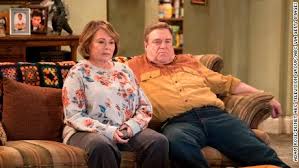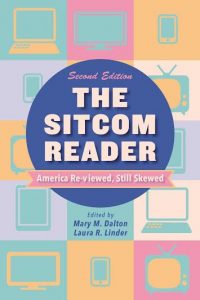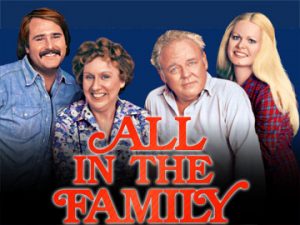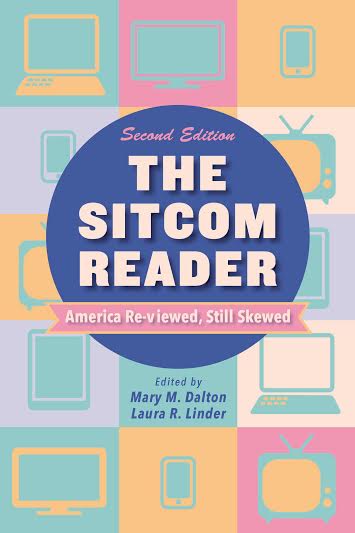When I was teaching in Copenhagen last semester, I didn’t watch much American TV, but I did read newspapers online.
When I read some of the opinion pieces about the Roseanne reboot, I cringed because I really liked the original series for (what I read as) its feminist messages, for bringing a working class family back to primetime, and for its inclusion of LGBT characters.
The weekend before Roseanne Barr’s racist tweet and the cancellation of the series, I actually sat down and watched the new episodes and was surprised that I didn’t find it patently offensive as I expected to based on what I had read.

Why? The competing viewpoints of the characters give the show an ideological tug-a-war that—while not sophisticated or perhaps ultimately useful—reflects the polarized discourse in the United States right now.
And, I suppose, I bracketed Roseanne Barr from my viewing of Roseanne Conner…for better or worse. I was willing to give the series a chance in the fall to see how the series might grow.
Surprisingly, or not, now that the show has been cancelled, I’m sort of relieved.
Deep down, I think I always suspected that Roseanne Barr’s baser instincts would overshadow the (sometimes uneven but still undeniable) legacy of the original series, and I didn’t relish waiting for that shoe to drop.
A journalist contacted me last week with a question: “Based on your work in editing The Sitcom Reader, I was wondering if you’d be able to weigh in on how this worked in the past. For example, did viewers of All In the Family connect the satire of Archie Bunker with the politics of the real-life people who created him, such as Norman Lear?”

He didn’t end up using our email conversation in his story, but there’s no reason I shouldn’t share my thoughts with you.
Before All in the Family, television networks practiced a programming strategy of “dead centerism,” which meant trying to appeal to the broadest possible audience by offending no one.
By the end of the 1960s, networks decided to try to target younger, more affluent viewers and cancelled a bunch of the rural sitcoms and spinoffs that were still pulling in strong ratings but were bolstered by viewers in more rural areas even if the series seemed bland and out of touch (such as The Andy Griffith Show spinoff Gomer Pyle, U.S.M.C., which aired from 1964-69 but never alluded to the Vietnam War).
This is the media landscape that welcomed All in the Family (1971-79). Norman Lear wasn’t a household name then, and we know more about his politics now than viewers did at the time (he co-founded People for the American Way in 1981).
Despite his own liberal perspectives, his television series are a mixed bag. I think it is important to note that all media texts contain competing messages—some intended by show runners and some unintended.
In the case of All in the Family, some viewers saw Archie as the bigot Lear intended, but others saw him as the guy next door they’d like to have a beer with or even as themselves.

Lear even made that reading appealing to some viewers through the contrast set up with Archie’s liberal counterpart, the “meathead” Michael. Archie loved and supported his family; Michael let Gloria and Archie support him as a graduate student.
Things become even more complex when other Lear sitcoms are considered.
Lear intended to celebrate the working class black family in Good Times, but the glorification of the J.J. character (whom some co-stars saw as a racist stereotype) led to the departure of John Amos from the series (there goes the intact, Black family) and, later on, the departure of Esther Rolle.
Lear was the Executive Producer, not the creator, but the series went out under his banner. Gerard Jones has written a compelling analysis of the Lear shows that you can find in the second edition of The Sitcom Reader. You can watch my interview with Jones or read a transcript of it here.
Most of the time, show creators are unknowns to the general public, so their politics aren’t a factor. Other times, stars develop shows or become integral to the development and their politics may be known.
This was the case with Cybill Shepherd and her series Cybill. As the eponymous character and a movie star, viewers may have been aware of Shepherd’s advocacy of women’s rights, and that was also a focus on the series, which was loosely autobiographical.
My co-editor Laura R. Linder and I liked the show a lot (so much so that we wrote a chapter on it), but the series only ran three seasons (at least partly because of personality problems on the set).
Another irony about the Roseanne story that fascinates me is the position of ABC.
A few days ago, I finished up the current season of Black-ish, a series I admire on multiple levels.
It is interesting to me the confluence of certain situations related to race and patriotism this week.
In 1990, Roseanne Barr gave a disrespectful performance of “The National Anthem.”
In 2018, Kenya Barris produced an episode of “Black-ish” about the NFL players who quietly takes a knee during the National Anthem in protest, and ABC has refused to air it on the grounds that it would be divisive to do so.
President Trump has celebrated Barr’s show (taking credit for the ratings) without regard to her past, and (according to information from a deposition cited in an articles last week) he badgered NFL owners into adopting punitive measures against players who protest respectfully and for cause.
Sitcoms have always been a location of hidden cultural truths and, as such, have always been and continue to be worth careful consideration.
It’s never just a television show…

This is one of the very few pieces I have read on this matter. To me, there really isn’t much to debate. The show’s original run was positively influential, as you note, Roseanne Conner is not Roseanne Barr, the reboot includes competing views, pushback, and nuisance (that I think most ignored if they even watched the episodes at all), and the show’s cancellation is the proper consequence of her tweet. (It is unsurpring that many try to draw the false equivalency between what Roseanne said and people who call out the president’s bigotry. It is unsurprising because 62 million people did vote for him, after all.) I read what Michael Moore posted on Facebook, and I read what Tom Arnold had to say. And I read your piece because I knew it would—as it does— provide context, insight, and a reminder to look at all the elements at play, both from the business of television and from the wider scope of culture and history. Thank you!
Thanks, Chad. Actually, hearing what you had to say about the series after my return was one of the factors motivating me to watch the reboot!
I’m glad I was coherent enough!